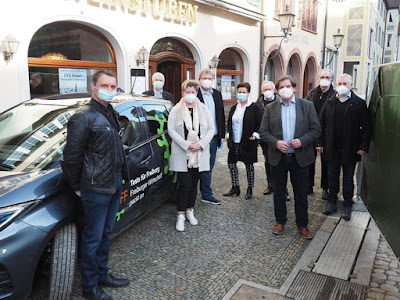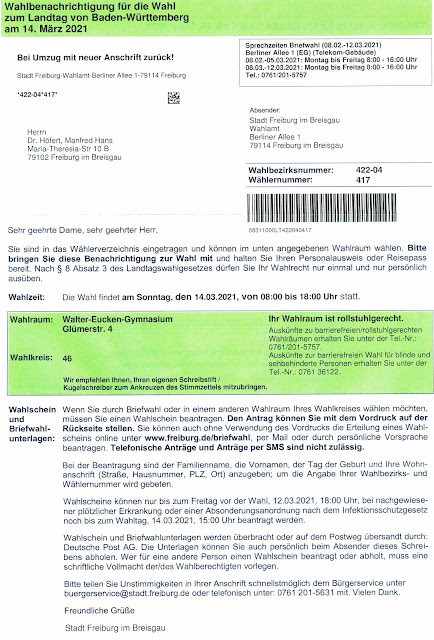While politically correct people struggle with
the natural and grammatical gender of nouns (NG and GG) in German-speaking countries, gender developments
are becoming insane in the UK.
Like Latin, as you may know, the German language has three grammatical genders, much to foreign learners' chagrin. Simple sets like cutlery come in
three GGs, i.e., der Löffel, male (the spoon), die Gabel female
(the fork), and das Messer neuter (the knife).
Already
Mark Twain complained:
To continue with the German genders: a tree is male, its buds are female, its
leaves are neuter; horses are sexless, dogs are male, cats are female --
tomcats included, of course; a person's mouth, neck, bosom, elbows, fingers,
nails, feet, and body are of the male sex, and his head is male or neuter
according to the word selected to signify it, and not according to the sex of
the individual who wears it -- for in Germany all the women, either male heads
or sexless ones; a person's nose, lips, shoulders, breast, hands, and toes are
of the female sex; and his hair, ears, eyes, chin, legs, knees, heart, and
conscience haven't any sex at all. The inventor of the language probably got
what he knew about a conscience from hearsay.And then Twain drives the difference between GG and NG
ad absurdum in a conversation about
die Steckrübe (the turnip) and
das Mädchen* (the girl):
*All words in German ending on the diminutives -chen or
-lein are neuter.Gretchen: Wilhelm, where is the turnip?
Wilhelm: She has gone
to the kitchen.
Gretchen: Where is the accomplished and beautiful English
maiden?
Wilhelm: It has gone to the opera. During my time at
the university, we were
Studenten (students), and it was understood that
the word comprised both male and female students. The problem arose because
die Studenten is the plural form of
der Student. So feminists
argue that female students are not included in the "male" plural form.
Well, you could use the female form
Studentin and address a crowd of students as
Liebe Studenten, liebe Studentinnen, but never say
Liebe Studenten. The German federal justice ministry now emphasizes that all state bodies should stick to "gender-neutral" formulations
in their paperwork.
In the case of
Studenten, a dreadful form
based on the present participle
Liebe Studierende (Dear those that
study) is officially used as "gender-neutral" throughout. The American
AYF-Studierenden in Freiburg got a special treat. They are affectionately called
Studies.
In my days at the University of Tübingen in 1955, we
frequently had our lunches not at the student's canteen but at the
Schlatterhaus
on
Österberg. The
Haus was run by the
Evangelische Studentengemeinde (Lutheran
Students' Community). It not only had better food but many female students.
Girls visiting the community house did not mind being called
Studenten.
How different the situation is today. In Freiburg, the Lutheran Regional
Church proudly presents the word monster
Evangelische Studierenden-Gemeinde.
There are other proposals to remedy female discrimination in "male" words. Red Baron already reported
the gender starlet forming the non-discriminating form of
Student*innen comprising all students. Other suggestions are the
Binnen-I (within-I), i.e.,
StudentInnen, or
the gender gap is written as
Student_innen.
In the
meantime, radical feminists supported by the University of Leipzig simply
demand the total
Frauisierung (womanizing) of the language, i.e., the female
form
Studentinnen is used throughout, making male Studenten look bad. Others
argue that
Studentinnen will comprise transgender people?

|
|
Proposed gender-appropriate traffic signs of crosswalks in Hamburg (©Elbvertiefung)
|
The German word for the crosswalk is
Fußgängerüberweg.
This already heavy construct becomes a gender-appropriate monster:
Weg für die
Zu-Fuß-Gehenden (path for those who go on foot).
Spoken
language is important too. In fact, anchor "people" on German television have started
replacing die Demonstrierenden in Myanmar with die Demonstrant'innen, marking a hiatus behind the "t." What a mess!
This could have been avoided had Luther used the low German dialects when translating the Bible from Greek. Lower German knows only one article, "de" instead of "der, die, das." So we Germans call anglophone speakers lucky. With their "the," they avoid any gender madness. Really?
Recently
The Guardian reported that the Brighton and Sussex University Hospital (BSUH)
is the first in the UK to formally implement a gender-inclusive language
policy for its maternity services department — which will now be known as
"perinatal services."
BSUH follows in their approach the British Medical Association, which said pregnant women should not
be called "expectant mothers" but "pregnant people" as it could offend
intersex and transgender men.
The BSUH Staff
have been told to avoid using the word "mothers" on their own. They have been
given a list of alternative terms to use when addressing patients, including
"mothers or birthing parents," "breast/chestfeeding," and "maternal and
parental."
Instead of saying "breastmilk," they
can choose from "human milk," "breast/chest milk," or "milk from the feeding
mother or parent."
Don't they have any other worries?
*


















